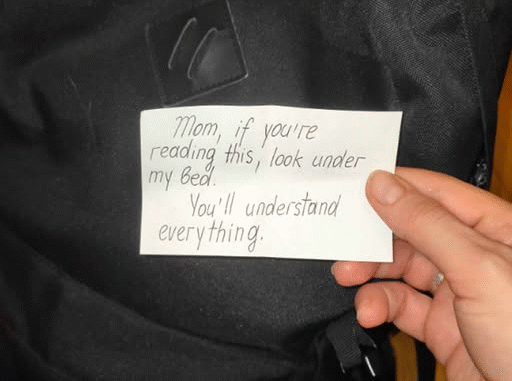
After losing my daughter, I was drowning in grief, but my husband’s haste to clear her belongings unveiled a betrayal that shattered our life. What I found in her room gave me the strength to let go of one love and hold onto another forever.
I’m Claire, 42, and the sound of earth on my daughter Sophie’s coffin still haunts me. When my husband pushed to erase her memory the day after her funeral, a hidden truth she left behind changed everything, guiding me from heartbreak to healing.
The cemetery was a blur of rain and grief. Each clod of dirt on Sophie’s casket hit like a blow to my heart. My friend Rachel’s steady hand kept me upright as mourners faded into the drizzle. Sophie, only 17, was gone—her college applications, dog-eared with dreams of becoming a marine biologist, left unfinished on her desk. “Fish can’t tell you they’re hurting, Mom,” she’d say. “I’ll learn to hear them.”
Our home felt hollow without her guitar strums or sneakers thumping the hall. My husband, Tom, stood at the graveside, his suit pristine, his face a blank mask. Our marriage had been distant for years, a quiet drift into strangers sharing a roof, but his stoicism now felt like a wall.
Driving home, I pressed my face to the car window, the world a grey smear. “Claire,” Tom said, voice clipped, “we should swing by the thrift store to check their drop-off hours. Rachel’s setting up food in the backyard for guests.”
“Why?” I asked, head throbbing.
“We need to pack up Sophie’s stuff,” he said. “It’s better to do it now, while it’s raw. Lingering will just hurt more.”
I stared, incredulous. “She was buried today, Tom. Have some respect.”
He shrugged. “It’s like pulling off a bandage—quick is kindest.”
At home, I saw boxes in the hall, labeled in Tom’s precise script: Donate. Trash. Keep. My stomach lurched. “When did you do this?” I demanded.
“This morning, while you were at the funeral home,” he said. “I had to stay busy, Claire. It’s how I cope.”
The boxes felt like a betrayal, reducing Sophie to a checklist. I fled upstairs, locking myself in the bathroom, sobs shaking me like a silent storm. I ignored Rachel’s gentle knocks, the hum of mourners below. That night, when the house stilled, I slipped into Sophie’s room.
Her bed was messy, a sweater tangled in the sheets. Her biology book lay open, highlighted in blue. I folded her clothes, breathing in her lavender scent, tears blurring the Polaroids on her walls—us, laughing with our dog, Luna. “I miss you,” I whispered.
Her backpack slumped in the corner. Inside, among pens and notebooks, I found a note tucked in her math book: “Mom, check my closet. You’ll see everything.” My hands shook—Sophie’s neat cursive, written with urgency, as if she knew I’d need answers.
I knelt by the closet, heart pounding, and pulled out a small wooden box. Inside was an envelope of photos and a USB drive. The first photo stopped my breath: Tom with a stranger, her arm around him, his smile warm. Another showed him with a young girl, her eyes mirroring Sophie’s.
I plugged the USB into my laptop. Sophie’s voice, steady but pained, filled the room. “Dad, why do you have another family?”
“It’s not what you think,” Tom said. “I love you, Sophie, but I’ve got others I care for. I’ve supported them for years. Don’t tell Mom—she can’t handle it.”
“You lied to us,” Sophie said, voice breaking. “I saw you with those kids at the park, said they were a friend’s. Why?”
The recording cut off. Photos and screenshots—bank transfers, hotel receipts, a locket purchase—spanned six years. Six years of lies. Sophie’s accident, a skid on a wet road, happened the same night as the recording. Was she crying when she lost control?
Tom’s footsteps creaked outside. I stood, clutching the USB. He entered, and I held it up, silent. His face drained of color. “Claire,” he stammered, “I can explain.”
“She knew,” I said, voice steady. “You wanted her things gone to hide this.”
He sank to the floor, head bowed. “I didn’t touch her car,” he swore. “I begged her to stay quiet. Then she… she was gone. Her stuff—it was killing me, Claire, reminding me of my shame.”
I felt nothing—no tears, no rage, just clarity. I walked out.
The next day, I filed for divorce at the kitchen table where Sophie once sketched fish. I kept every scrap of her life—her sweater, her books, her dreams. I sent copies of the photos and recording to Tom’s other family, no note, just truth. They deserved to know the lie we’d all lived.
Tom lives alone now, supporting two families who see through him. Some nights, I sit in Sophie’s room, her sweater against my cheek, listening to her last words on repeat. She gave me the truth, setting me free.
Rachel visited a month later, slipping in quietly. I sat in Sophie’s room, window open to the breeze. She joined me on the floor, taking my hand. “I don’t know how to keep going,” I whispered.
“You don’t have to,” she said. “Just breathe.”
“I’ll break if I let it all out,” I said, a tear falling.
“Then break,” she replied. “I’ll stay right here.”
I leaned into her, sobbing freely. There was no fixing this pain, but in Sophie’s room, with Rachel’s warmth, I felt her—my girl—in every sunrise, every breeze, every memory we’d never lose.